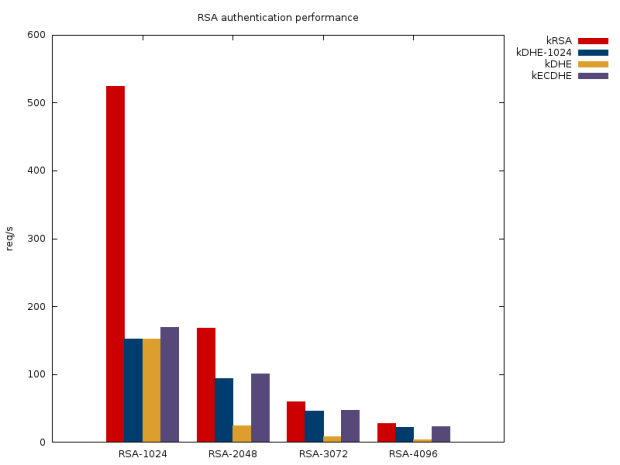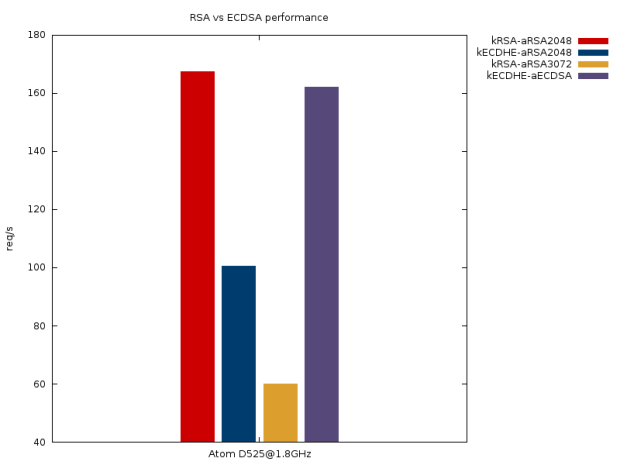Update 2017-07-03: nginx does support hybrid configuration with RSA and ECDSA certificates for single virtual host
As servers negotiate TLS connection, few things need to happen. Among them, a master key needs to be negotiated to secure the connection and the client needs to be able to verify that the server it connected to is the one it intended to connect to. This happens by virtue of key exchange, either RSA, finite field Diffie Hellman (DH) or Elliptic Curve Diffie Hellman (ECDH). The server itself can be identified using either RSA or Elliptic Curve Digital Signature Algorithm (ECDSA) based certificates. All of them have their strong sides and weak sides, so let’s quickly go through them.
RSA key exchange
This way of deriving the key securing the connection is the simplest of the mentioned. It is supported by virtually all the clients and all the servers out there. Its strong point is relative high performance at small key sizes. Unfortunately, it doesn’t provide Forward Secrecy (PFS), which means that in case of private key leak all previous communication will be possible to decrypt.
Side note: while the acronym PFS stands for “Perfect Forward Secrecy”, the term “Perfect” comes from cryptography where it has a slightly different meaning than in vernacular. To limit confusion I’ll be calling it just “Forward Secrecy”.
Finite field Diffie-Hellman key exchange
Forward Secrecy is the prime feature of the ephemeral version of Diffie–Hellman. Its main drawback is high computational cost. Additionally, not all clients support it with RSA authentication, all versions of Internet Explorer being the prime example. While there exist a non ephemeral version of DH, it doesn’t support PFS nor has widespread support so we will ignore it for now.
Elliptic Curve Diffie-Hellman key exchange
ECDH is the new kid on the block, this means that it is supported only by relatively new clients. The strong points are low computational cost and much smaller key sizes for the same security levels. Similarly to DH, there exist ephemeral and non ephemeral version of it, the latter has limited support in clients and does not provide PFS.
RSA authentication
It’s the venerable and widely supported cryptosystem. Supported by virtually anything that has support for TLS or SSL. With us since the SSLv2. Unfortunately it’s starting to show its age, performance at key sizes providing 128 bit level of security is rather low and certificates are starting to get rather large (over 1KiB in size for 3072 bit RSA).
ECDSA authentication
Elliptic Curve Digital Signature Algorithm, just like ECDH is a new cryptosystem. This causes it to suffer from same problem: no support for it in old clients. It does use much smaller key sizes for the same security margins and is less computationally intensive than RSA.
Benchmarking
While the key exchanges and authentication mechanisms are relatively separate, in TLS the ciphersuites limit the available options. In fact, for the ECDSA ciphers, only ECDH key exchange is available. Or to spell it out, I could test only following configurations:
RSA key exchange - RSA authentication DHE key exchange - RSA authentication ECDHE key exchange - RSA authentication ECDHE key exchagne - ECDSA authentication
The tested key sizes were: 1024 bit RSA as the recently obsoleted commonly used size, 2048 bit RSA as the current standard key size, 3072 bit as the recommended key size for systems that have to remain secure for foreseeable future, 4096 bit as the minimal size that matches the existing CA key sizes and is secure for foreseeable future (as there are virtually no commercial CAs that have 3072 bit key sizes) and finally 256 bit ECDSA as the recommended key size for secure systems for foreseeable future.
The tests were done on Atom D525 @ 1.8GHz with 4GiB of RAM (as an example of lowest performance on a relatively modern hardware) and used httpd-2.4.10-1.fc20.x86_64, mod_ssl-2.4.10-1.fc20.x86_64 with openssl-1.0.1e-39.fc20.x86_64. Interestingly, while this CPU has SSSE3, it doesn’t have AES-NI or SSE4.1, this makes AES-128-GCM faster than AES-128-CBC (50.7MiB/s vs 27.8MiB/s). Every query from client has downloaded 4KiB of data. The graphs show the maximum performance while serving concurrent users (usually around 8-10 at the same time).
So, lets compare RSA authenticated ciphers performance.
We can clearly see that that using non PFS enabled key exchanges brings huge performance improvements for legacy key sizes. RSA key exchange at 1024 bit is actually over 3.4 times faster than DHE key exchange. At this small sizes, using 256 bit ECDHE also doesn’t show much performance advantage over DHE, it is just 11% faster (note though that it is also comparable to 3072 bit DHE in security level).
Going to 2048 bit RSA, the performance advantage of not using PFS ciphers quickly shrinks. Here using RSA key exchange over 1024 bit DHE gives about 78% more performance. This configuration, while common because of lack of support of higher DHE parameter sizes in older Apache servers, doesn’t really provide higher security against targeted attack than use of 1024 bit RSA. Use of ECDHE is also looking much more interesting, at only 40% penalty compared to RSA key exchange. Using DHE key exchange with matching parameter sizes give performance that is nearly 7 times slower than pure RSA.
ECDHE shows its real potential at the 3072 bit RSA key size where while providing PFS with matching level of security it requires just 26% more computing power, again outperforming 1024 bit DHE. The ephemeral DH with matching key size gives a truly abysmal 800% drop in performance.
At the 4096 bit level, where the 256 bit ECDHE is the weaker link, pure RSA key exchange is just 18% more power hungry.
So, how does it compare to ECDSA key exchange?
If we use the currently acceptable 2048 bit RSA key exchange, it will turn out that the RSA is about 3% faster than the combination of ECDHE key exchange and ECDSA authentication (both using 256 bit curve). But if the required security level reaches 128 bits or PFS is required ECDSA with ECDHE is much faster.
ECDHE and ECDSA with 256 bit curves is 2.7 times faster than 2048 bit RSA with 256 bit ECDHE and 3.4 times faster than 3072 bit RSA alone!
Apache
In other words, if you’re running Apache web servers you should consider using two certificates for the same site. This will allow to negotiate RSA cipher suites with the legacy clients while it will provide lessened load on the server with modern clients.
The configuration is also relatively simple, you just need to specify certificate and key file twice:
SSLCertificateFile /etc/pki/tls/certs/example.com-RSA.crt SSLCertificateKeyFile /etc/pki/tls/private/example.com-RSA.key SSLCertificateFile /etc/pki/tls/certs/example.com-ECDSA.crt SSLCertificateKeyFile /etc/pki/tls/private/example.com-ECDSA.key
and make sure that your SSLCipherSuite doesn’t disable ECDSA authenticated ciphersuites (just check if this command outputs anything: openssl ciphers -v <cipher string from apache> | grep ECDHE-ECDSA).
nginx
For nginx, the configuration is very similar, you will need to run the relatively new 1.11.0 version, or later (see CHANGES) though.
ssl_certificate /etc/pki/tls/certs/example.com-RSA.crt ssl_certificate_key /etc/pki/tls/private/example.com-RSA.key ssl_certificate /etc/pki/tls/certs/example.com-ECDSA.crt ssl_certificate_key /etc/pki/tls/private/example.com-ECDSA.key
Similarly, you need to make sure that the cipher string used doesn’t disable ECDSA authenticated ciphersuites.


Hi!
Very interesting reading! However, if I have RSA keys, how to I convert them to ECDSA? Or have I missunderstood something elementary? 🙂
/Peter
You need to generate new keys and have them signed again.
Nginx supports two certificates for the same site. Update this
Yes, nginx now does support this configuration, I did write this post about 2 years before that change was released…